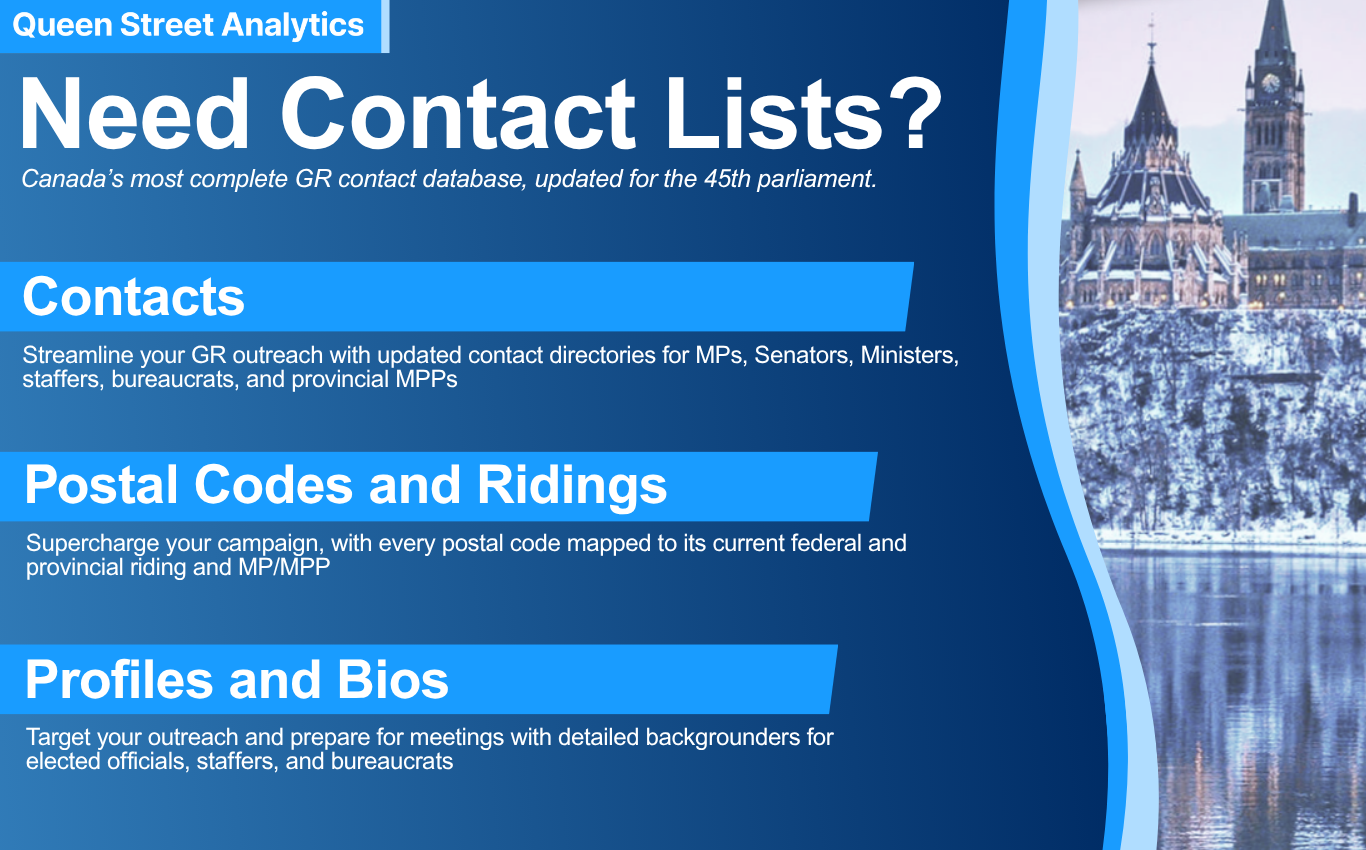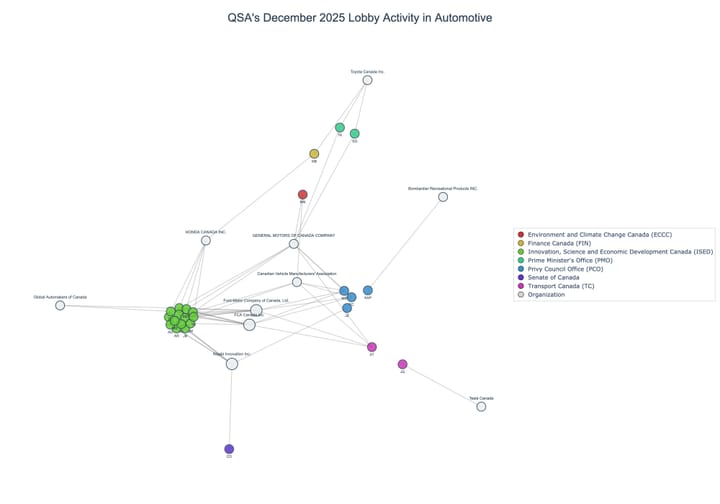QSA's Week in Automotive (#30, 2025)
Canada allocates $21M to transport decarbonization R&D; Federal consultation on interprovincial trade regulation; US proposes repeal of GHG vehicle standards; Trump administration suspends duty-free de minimis imports; Key tariffs shift under new US orders.

Good morning! This is Queen Street Analytics' weekly roundup of regulatory developments, legislative discussions, political announcements and other government-related news for car manufacturers, parts suppliers, car dealers, and others in the automotive industry. Every Monday, we break down the most important updates in this space in under five minutes.
Want to track the upstream and downstream forces affecting Automotive? Don’t miss this week’s updates in Manufacturing and Oil & Gas.
Dates: 2025-07-27 to 2025-08-02
📋 In This Week's Newsletter
• 🇨🇦 Canadian Federal GR News
• 🇺🇸 US Federal GR News
• 🗺️ Canadian Provincial GR News
• 📚 What We're Reading This Week
Canadian Federal GR News
Canada Funds $21 Million in Transportation Decarbonization Projects
Natural Resources Canada announced more than $21 million in funding for nine projects aimed at reducing greenhouse gas emissions from Canada's transportation sector. The initiative targets technical and market barriers for medium- and heavy-duty vehicles (MHDVs) that use low or zero-emission technologies, including funding for powertrain R&D, hydrogen–electric truck development, and grid-support solutions. Notably, $4.97 million was granted to the City of Toronto to repower 60 compressed-natural-gas waste-collection vehicles with hybrid-electric systems. Demonstration projects will also support electric vehicle (EV) charging innovation (e.g., AlumaPower’s aluminum-fueled generator with Purolator Canada), development of an AI-powered battery-electric bus deployment toolkit by McMaster University, and a range-extending lightweight transmission system by Inmotive Inc. Funding recipients include both public sector partners and private manufacturers, with specific allocations ranging from $900,000 to $5 million per project.
Sources: Announcements: www.canada.ca

Federal Consultation Invites Input on Free Trade and Labour Mobility in Canada Act Regulatory Design
The Privy Council Office published a notice in the Canada Gazette requesting feedback from stakeholders to support the regulatory framework for the new Free Trade and Labour Mobility in Canada Act, which received royal assent on June 26, 2025 as part of Bill C-5. The Act, not yet in force, is intended to reduce federal barriers to interprovincial trade and labor mobility by recognizing comparable provincial/territorial regulatory requirements and certificates. For goods and services with both federal and provincial requirements, compliance with a comparable provincial standard would meet the corresponding federal rule, except where health, safety, or environmental concerns present a significant risk. The consultation seeks input on areas or sectors of potential impact, possible exceptions, and related risk mitigation, with submissions due by August 22, 2025. Sectors relevant to automotive, such as Motor Carrier Safety Fitness, energy efficiency, and Commercial Vehicle Drivers Hours of Service, may fall under the Act’s proposed scope.
Sources: Gazette, Part I: www.gazette.gc.ca
Machinery and Equipment Price Index Updated for May 2025
Statistics Canada released new data for the Machinery and Equipment Price Index (2016=100), covering May 2025. The update captures the price trends for machinery and equipment, which can impact cost structures in the automotive manufacturing and parts sectors.
Sources: Open Government Data Set: www.statcan.gc.ca
US Federal GR News
EPA Proposes to Repeal Greenhouse Gas Vehicle Emission Standards
The Environmental Protection Agency issued a proposed rule for public comment that would rescind the 2009 Endangerment Finding for greenhouse gases (GHGs) from new motor vehicles and engines and repeal all GHG emission standards for light-, medium-, and heavy-duty vehicles and engines. The 900+ page proposal argues that Clean Air Act section 202(a) does not clearly authorize regulation of GHGs for global climate change and raises concerns over the statutory and scientific basis for prior standards. If finalized, the action would remove GHG fleet-average requirements, test procedures, and related compliance obligations for manufacturers—though standards for criteria pollutants and fuel economy administration would remain. The public has until September 15, 2025 to submit comments, and a virtual public hearing will be held August 19–20, 2025.
Sources: U.S. Federal Announcements: www.federalregister.gov
White House Suspends Duty-Free De Minimis Import Treatment for All Countries
On July 30, 2025, President Trump issued an executive order suspending duty-free de minimis treatment under 19 U.S.C. 1321(a)(2)(C) for all countries, citing national emergencies relating to trade deficits, illicit trade, and enforcement gaps. Effective August 29, 2025, duties will be assessed on all low-value shipments, except certain international postal shipments. The order directs carriers to collect and remit duties and is aimed at preventing tariff evasion and illicit supply chains. Automotive and auto parts importers using low-value shipments are directly affected.
Sources: White House Announcements: www.whitehouse.gov
President Trump Modifies Reciprocal Tariff Rates and Imposes Penalty Duties for Transshipment
On July 31, 2025, President Trump issued a follow-up executive order revising reciprocal tariff rates to address persistent U.S. trade deficits. The order imposes new ad valorem duties on imports from specific countries, with a 10% duty applied to goods from unlisted countries and a 40% penalty on goods determined to have evaded duties via transshipment. Dispute monitoring, retaliatory provisions, and new enforcement mechanisms involving Commerce, CBP, and USTR are included. Goods in transit before the effective date are generally excepted.
Sources: White House Announcements: www.whitehouse.gov
Bilateral U.S.-EU Trade Deal Sets New Tariff Terms for Industrial and Automotive Flows
The White House announced a comprehensive U.S.-EU trade agreement, which eliminates EU tariffs on U.S. industrial goods and establishes a 15% tariff on certain EU imports to the U.S., while maintaining 50% tariffs on steel, aluminum, and copper. The deal also addresses non-tariff barriers and contains rules to limit third-country supply chain circumvention. Provisions for major EU commitments on U.S. energy, military goods, and electronics were publicly detailed. For automotive and related sectors, the agreement affirms unchanged tariffs on U.S. auto exports into the EU and continued restrictions on import flows from certain global suppliers.
Sources: White House Announcements: www.whitehouse.gov
US Announces Countervailing Duties on Chassis and Subassemblies from Mexico and Thailand
The Department of Commerce issued preliminary determinations that countervailable subsidies are provided to producers and exporters of certain chassis and subassemblies from both Mexico and Thailand for the period January 1–December 31, 2024. In the Mexico investigation, the preliminary rate for Hyundai de Mexico S.A. de C.V., nine non-responsive companies, and all others is 133.18%, with cash deposits required at this rate. For Thailand, the preliminary subsidy rates range from 2.24% to 9.42% for named producers, with others at 7.97%. Liquidation of subject entries is suspended, and interested parties may request a hearing or submit case and rebuttal briefs before final determinations expected by December 8, 2025. Chassis products for commercial vehicle use are included, with dry van, refrigerated, and flatbed trailers excluded.
Sources: U.S. Federal Announcements: www.federalregister.gov, U.S. Federal Announcements: www.federalregister.gov
Canadian Provincial GR News
Alberta Consults Industry on Marked Fuel Tax Exemption Reform
Alberta opened a consultation with marked fuel sellers and purchasers regarding a proposal to phase out marked fuel and replace it with a tax exemption for clear fuel, while retaining the existing tax rate for eligible agricultural and resource industry users.
Sources: Provincial Announcement: www.alberta.ca
What We're Reading This Week
- Trump’s EPA is targeting key vehicle pollution rules. What that means for carmakers: News analysis of the EPA’s recent moves to reverse key greenhouse gas vehicle standards.
- What Trump's environmental plan targeting key pollution rules means for carmakers: CBC covers industry response and legal context to proposed US regulatory changes.
- David Olive: Trump could spell the death of Canadian auto production. Here’s Plan B: Analysis on strategic options if US automotive protectionism escalates.
- Auto theft sees sharp drop in first half of 2025, industry association says: Reporting on improved automotive theft statistics for H1 2025.
- Quebec auditor general probes millions in subsidies to failed EV battery maker Northvolt and Lion Electric: Post explores implications of government support for EV suppliers.
- Opinion | Canada builds America’s cars. Treating us like Japan or Europe makes no sense: Op-ed on US-Canada automotive production relationship.
- Ford raises projected tariff hit to results, shares down 4% after the bell: Coverage on Ford’s revised forecasts following new US tariff announcements.


